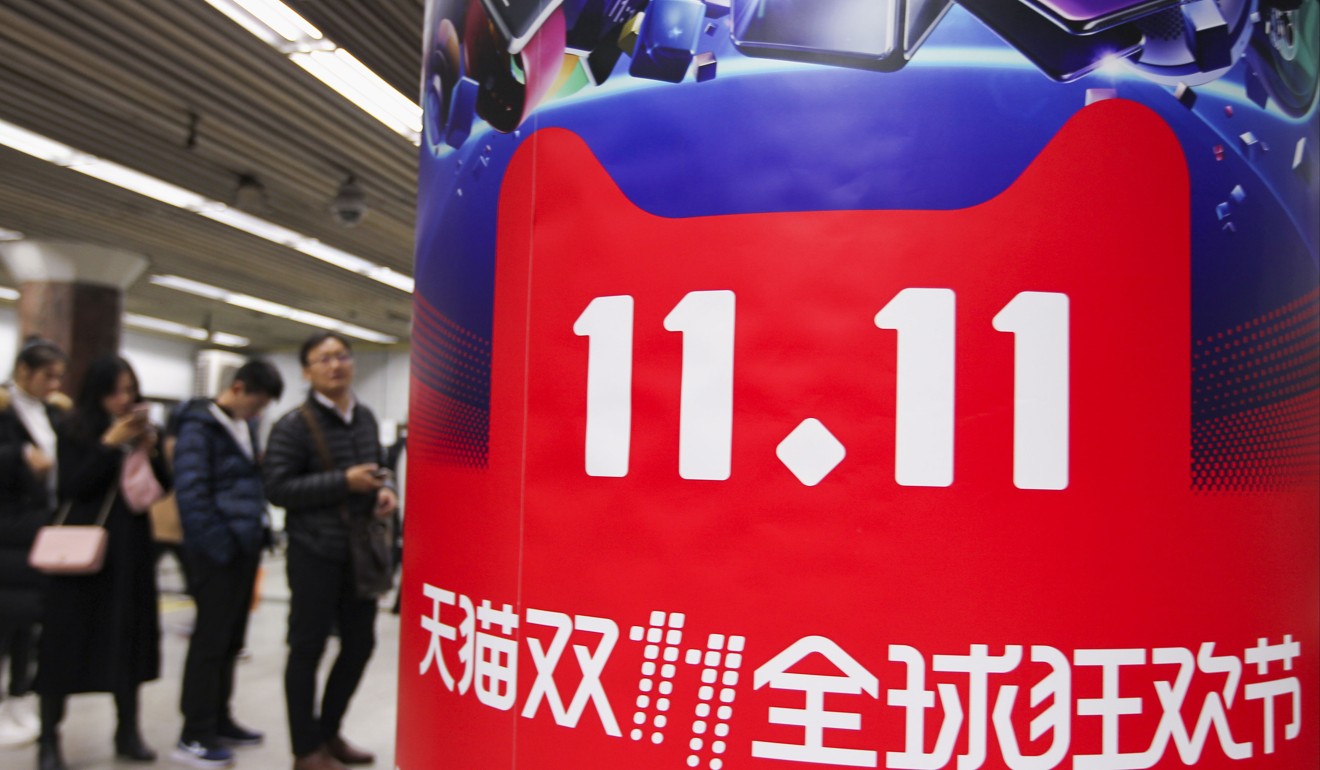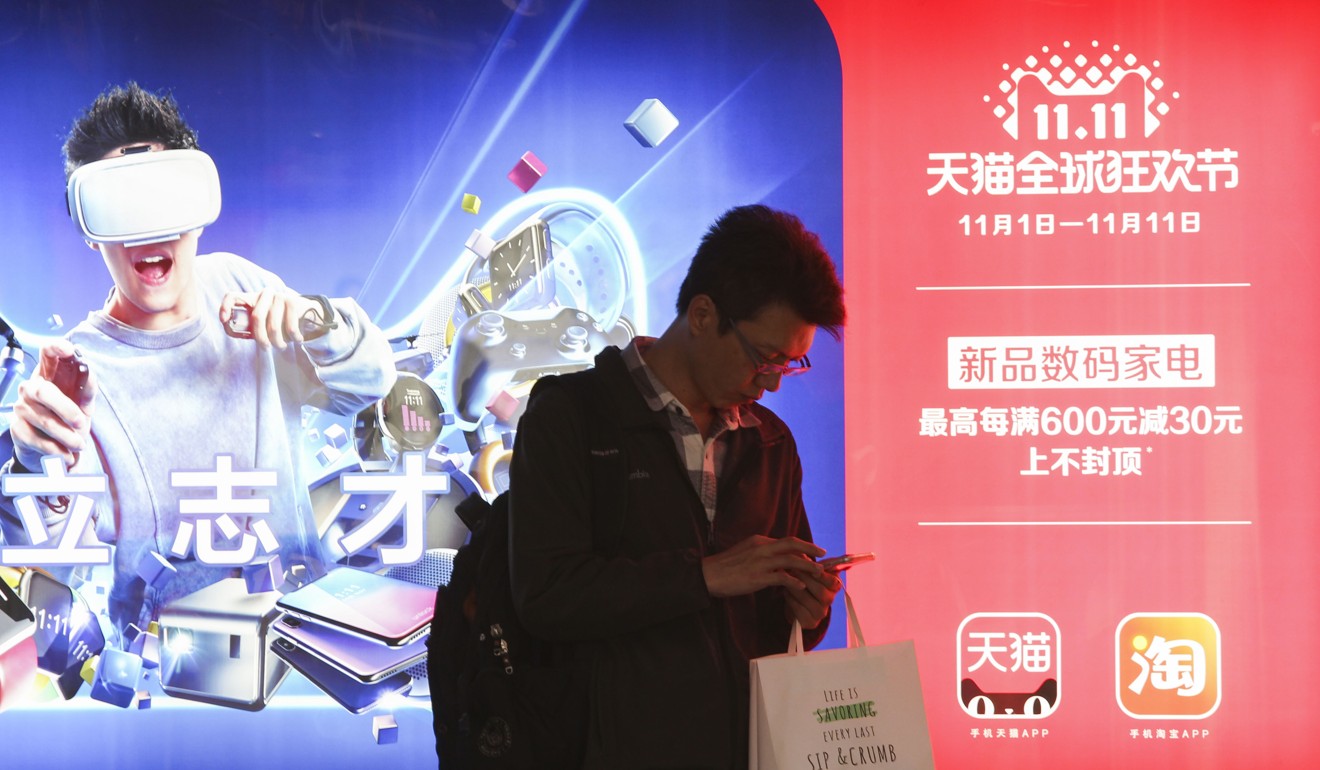
10 years on: Singles’ Day is ‘Christmas Day, Boxing Day and Black Friday all wrapped into one’
- This year, Alibaba is aiming to make its Singles’ Day extravaganza bigger than ever, with 180,000 participating brands
- For the first time, Alibaba is also including many of its offline and online partners and affiliates, such as New Retail supermarket chain Hema
Like many young, educated white-collar employees in the bustling technology hub of Shenzhen, weekends are precious days of rest for Jeff Guo, a 30-year old operations manager in a Shenzhen start-up. On weekends, Guo can be found having a hearty meal with friends, singing his heart out at a karaoke lounge or playing mahjong till the wee hours of the morning.
But since October, having the weekends off has been a rarity for Guo. In recent weeks he has had to work overtime – as much as seven days a week – as his company gears up for the upcoming Singles’ Day shopping extravaganza, where merchants around the country slash prices on their wares and Chinese consumers splurge tens of billions of dollars shopping online.
Guo’s employer, Shenzhen Huishenghuiying Technology, which manufactures popular home cinema-related products, has taken part in the Singles’ Day festival for the last five years. This year is no different, and Guo busies himself making sure that the company has enough inventory and that its promotions will run smoothly as the year’s busiest workday draws nearer.
Singles’ Day, which falls on November 11 and celebrates its 10th anniversary this year, started out as a sort of anti-Valentines’ Day, when single Chinese university students began spending money on nice things for themselves in defiance of society’s pressures to be in a relationship.
Catching on to the trend, e-commerce firm Alibaba, which owns the South China Morning Post, in 2009 launched its first ever Singles’ Day shopping festival, where participating merchants would offer discounts to consumers.
The 2009 shopping festival gathered around 52 million yuan (US$7.5 million) in sales – but just five years later this had skyrocketed over 1,000 times to 57 billion yuan in sales. Last year, it hit a record 168 billion yuan over a 24-hour period of frenzied shopping – eclipsing Black Friday and Cyber Monday sales in the US by four times.
Sales during the Singles’ Day period are critical for merchants like Huishenghuiying, as the revenue from the two-week period in November, when merchants start offering discounts to consumers, can make up a critical part of its annual revenue.
“We cannot afford losing the battle in big shopping events like Double 11, which could generate revenues that are several times more than our other months,” said Guo, who added that the shopping festival is seen as the most critical event for any Chinese firm that draws revenue mainly from online sales.
Guo recalled working for a women’s clothing company in Shenzhen several years ago, back when Alibaba’s Singles’ Day event was just starting out.
“Back then, we didn’t participate in the first two Singles’ Day events as no one expected that the Double 11 festival would become such a hit,” Guo said. “But we missed out on the opportunity as some of our competitors achieved great sales.”
For start-ups like Huishenghuiying, sales often start slowing from October, as consumers hold back from making purchases in the hope that the products they want to buy will be discounted during Singles’ Day. The moment the clock strikes twelve on November 11 and the best discounts go live, online orders start to swarm in.
“Everyone in the company, including my boss, will position themselves in front of the computers in the office to watch the sales numbers once it’s midnight on November 11, as we all know that our sales during the festival are critical to our annual sales performance,” Guo said.

Alibaba chief executive Daniel Zhang Yong last year called the Singles’ Day festival the “Olympic Games for Chinese merchants”, as brands often plan and strategise different deals and promotions to maximise the amount of sales and margins they can make during the 24-hour extravaganza. In 2017, five merchants exceeded 1 billion yuan in sales each – or the equivalent of what it would cost to buy about 430 Ferrari 812 Superfast sports cars.
Alibaba’s one-day shopping phenomenon is largely driven by consumers. Brands often advertise the Singles’ Day discounts they are offering on limited quantities of their bestselling items, and many customers would add these items from their wish list to their shopping trolleys in the days leading up to festival. Once midnight strikes, a fast fingers-first frenzy ensues as consumers race to check out the items in their cart before they sell out.
Last year, Alibaba sold some US$1.5 billion worth of goods in the first three minutes of Singles’ Day – the figure ballooned to US$5 billion once 15 minutes had passed.
Tracy Huang, who lives in Suzhou city in eastern Jiangsu province, is one such consumer. Years of online shopping and Singles’ Day frenzies have made Huang something of a veteran shopper – by now, she claims that she is able to easily identify which of her daily essentials are discounted the most, and uses the Double 11 shopping festival as a chance to stock up on necessities.
A month before November 11, Huang stops all online shopping activities. Throughout the weeks leading up to the actual day, Huang adds around 100 items to her shopping trolley, some of which can be discounted by as much as 50 per cent.
But despite her meticulous preparation, Huang says that she has not succeeded in getting everything in her shopping trolley during Singles’ Day in previous years, as the most popular items can go out of stock in seconds.
“It’s a battle for consumers like me when it comes to competing for good bargains,” said Huang. “You need to be really fast in checking out and paying for the popular items.”
However, Huang believes that the discounts in the early days of Alibaba’s largest shopping festival were much more attractive than in recent years, and that merchants are now adding more conditions.
“I know some friends who are tired of these promotional activities and events, and are now not willing to spend much time shopping during Double 11,” said Huang. “But I still enjoy it, because at the end of the day it still offers me the best deals.”
This year, Alibaba is aiming to make its Singles’ Day extravaganza bigger than ever, with 180,000 participating brands. To lure consumers, it is making 500,000 products available for pre-order, sweetening the deal with additional discounts if the orders are placed via mobile apps.
For the first time, Alibaba is also including many of its offline and online partners and subsidiaries into the festival, such as its New Retail supermarket chain Hema, food delivery arm Ele.me, and video platform Youku. The company has set an ambitious goal this year – to attain 1 billion orders within 24 hours across its entire ecosystem both in China and overseas.
“To keep the event fresh and exciting, Alibaba will need to continue to surprise increasingly demanding Chinese consumers with entertainment and festivals to delight them around the event,” said Pascal Martin, partner at OC&C Strategy Consultants in a statement ahead of the Double 11 festival. “November 11 [shopping festival] … is now a major annual milestone in China’s cultural calendar.”
The move to bring on board offline retailers such as Hema and Alibaba partner RT-Mart has for the first time allowed customers like 62-year old Wang Huaping to take advantage of the deals available.
Wang still struggles with the smartphone gifted to her by her daughter, and uses just the most basic functions on the device – phone calls and WeChat for messaging. However, she shies away from online shopping because she finds e-commerce marketplaces difficult to navigate.
Instead, Wang prefers shopping offline at bricks-and-mortar stores, where she can see and touch the items on display, she said. But her preference for offline shopping means that Wang has not been able to receive discounts on her purchases on Singles’ Day.

Alibaba’s offline retailers joining the Singles’ Day festival this year might change things for her. Wang, who frequents RT-Mart and Hema supermarkets, was pleased to find out that some stores will also offer a number of promotions on November 11.
“I’ve always been a bit hesitant to use the internet as I always think that I will mess up now and then. Singles’ Day is not the type of event that I could be involved in,” she said. “But since many supermarkets on the streets are now also going to be a part of that, I guess I am now also a participant to this event now.”
The Singles’ Day event is now the largest shopping extravaganza globally, and last year US retailers and brands such as Barney’s, Ralph Lauren and The Body Shop all offered discounts to customers in the US. Elsewhere in Asia, Singles’ Day promotions are also prevalent in markets like Singapore and Malaysia, where there is a large Chinese diaspora.
This year, more merchants affiliated with Alibaba and consumers outside China are expected to join in the festivities. Southeast Asian e-commerce subsidiary Lazada Group will hold for the first time Singles’ Day promotions across Singapore, Malaysia, Thailand, Indonesia, the Philippines and Vietnam, according to Alibaba.
Marketplaces like Zalora, Shopee and Expedia are offering consumers in markets like Singapore discounts if they shop on the platforms during the Singles’ Day period.
However, recent China-US trade tensions and a weak stock market have battered consumer confidence, according to Shaun Rein, managing director of China Market Research Group.
“Sales from Double 11 are still going to grow, but not as much as before,” Rein said, adding that many brands are likely to have to offer deeper discounts this year to encourage consumer spending.
But Rein acknowledged that Singles’ Day has changed global strategies for retail brands.
“10 years ago, Singles’ Day was still a minor event, and brands were focused on promotions for the Lunar New Year,” he said.
“Now Singles’ Day is a bonanza – it’s Christmas Day, Boxing Day and Black Friday all wrapped into one. It’s not just for singles any more, it’s for everyone, offering everything from cheap items to big-ticket purchases.”


